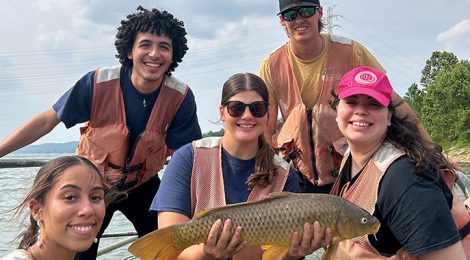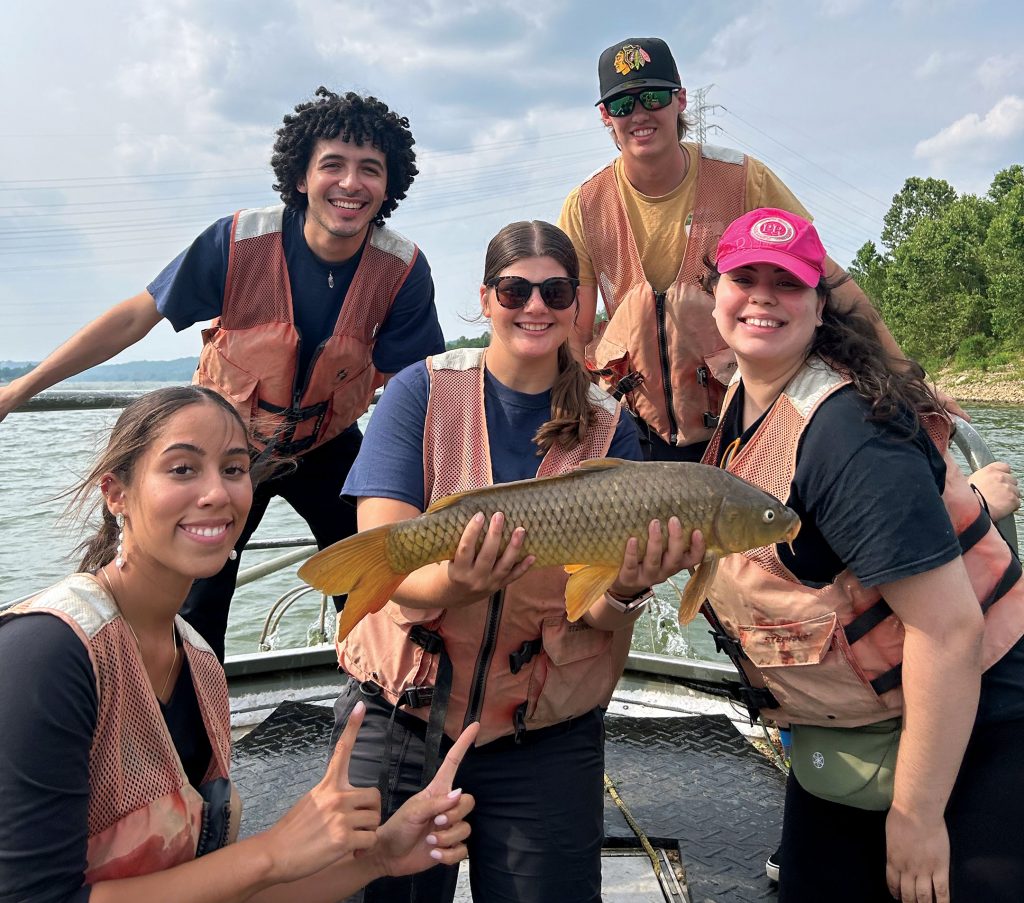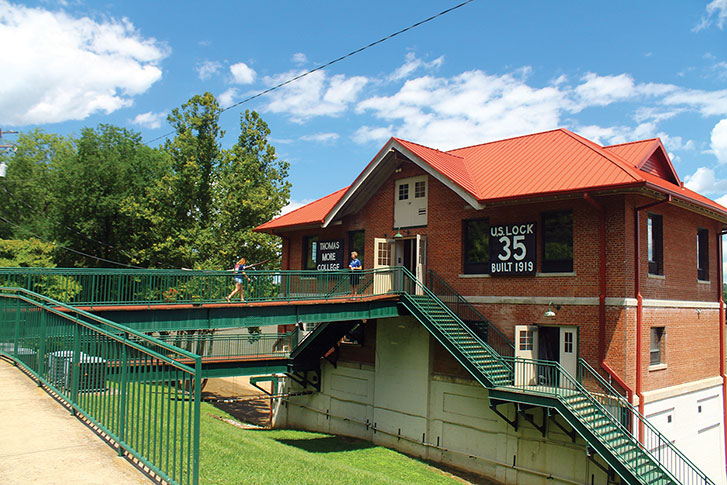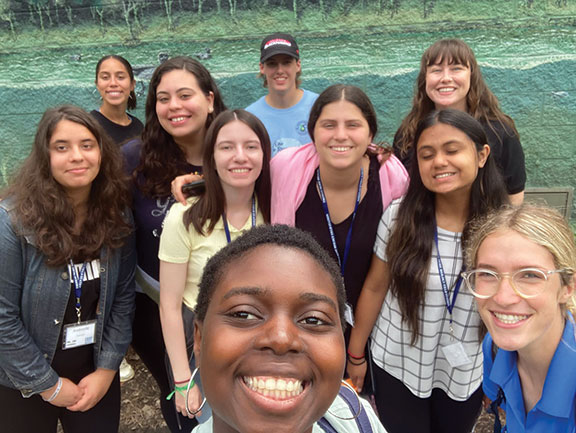
Biology Field Station: vital to river research

A focus on sustainability and recent regional water quality issues and toxic chemical concerns have served to shine a spotlight on the crucial work carried out at the Thomas More University Biology Field Station. Faculty and students at the Field Station perform ongoing monitoring and research of the Ohio River and its tributaries which helps to protect the ecosystem and ensure the safety of those using the river’s resources. This work not only advances scientific knowledge, but also helps to improve the quality of life in the region. The Field Station’s efforts have been recognized through the awarding of grant dollars, invitations to academic presentations, expansion of staff members, and inclusion in non-profit endeavors.
Award-Winning Research
The Field Station was named as an award recipient for Duke Energy’s new 2023 Climate Resiliency grant program which funds scientific research in the areas of climate change. The Field Station’s grant project focuses on the assessment and monitoring of water quality in the Ohio River and on the conservation of threatened and endangered aquatic species that have been and will continue to be impacted by climate change. “The project also supports workforce development as my research assistants are the undergraduate interns that lived at the Station throughout the summer,” explains Christopher Lorentz, Ph.D., director of the Biology Field Station. The 2023 intern cohort included four students from Thomas More and seven from other universities, including four from Universidad del Sagrado Corazón, Thomas More’s sister school in Puerto Rico.
Regional Support and Advocacy
Canadian wildfires in early summer 2023 created air quality issues for many Americans, with pollution causing the Air Quality Index to reach an “unhealthy” range in Greater Cincinnati. The poor air quality in turn raised concerns about water quality in the region. The Kentucky Enquirer interviewed several local experts about the fire’s impact on the Ohio River and the return of harmful algal blooms. Lorentz served as one of the local experts, sharing insight gained from recent water quality research at the Biology Field Station. “Air quality has less of a direct impact on water quality. Emissions are the problem,” Lorentz was quoted on the front page of the Enquirer.
Lorentz also shared research during a lecture at Shawnee State University about the water quality of the Ohio River. The Jane M. G. Foster Distinguished Lecture Series hosted by Shawnee State brings world renowned authors, leaders, and experts in a variety of academic fields to their Portsmouth, Ohio campus each year. Lorentz’s lecture came on the heels of the East Palestine train derailment, which caused concern about drinking water quality and public health for many residents along the Ohio River.

Lorentz’s research and the Biology Field Station were also highlighted in a special Ohio River edition of Cincy Magazine published in May 2023. The magazine featured an article by Lorentz entitled, “One of America’s Great Rivers.” The article conveys the important role the Ohio River plays in the region through its vibrant and resilient ecosystem, and its improved water quality conditions. “At the Center for Ohio River Research & Education at Thomas More University, we’ve been conducting research on the biodiversity and ecology of the Ohio River watershed for over 50 years,” Lorentz states in the article. “Levels of bacteria and other potential threats are consistently well below the upper limits for safe contact recreation.” Lorentz does add that there is still work to be done to protect the river and its surrounding communities. “The Ohio River is a bellwether for our nation’s commitment to conservation, environmental protection, and environmental justice.” Some non-profit organizations are working to “celebrate the value of the river, recognize its challenges and create solutions.” One of those organizations is the Ohio River Basin Alliance (ORBA).
Utilizing his research on the Ohio River, Lorentz serves as vice chair of ORBA, a non-profit organization working to create an ecosystem restoration for the basin. On April 18, 2023, American Rivers 2023 Endangered Rivers Report named the Ohio River as the second most endangered river in the United States. “The Ohio River unifies 30 million people across 15 states, from New York to Mississippi,” states the report. “The upper river is threatened by industrialization and pollution, recently exemplified by the East Palestine train derailment. This ongoing chemical disaster underscores the vulnerability of the Ohio River and the need for increased safeguards and durable funding for additional and continuous monitoring.” ORBA, on the heels of this news, is urging Congress to designate the river as a federally protected water system and commit to fund both the Ohio River Restoration Plan and Ohio River Valley Water Sanitation Commission’s technical upgrades.
The work of ORBA continues to meld with that of the Biology Field Station as the Station welcomed newly appointed general of the Great Lakes and Ohio River Division (GL/OR) of the U.S. Army Corps of Engineers on Aug. 17, 2023. Brigadier General Mark C. Quander was appointed as commander of the GL/OR Division in June of 2023. As part of his transition, he was asked to get to know key stakeholders, particularly those whose work revolves around the region’s water issues. Quander and his staff visited the Field Station to learn more about the research taking place and about ORBA.
Welcome New Staff
Molly Williams was welcomed as the first-ever, full-time Field Station manager in summer 2023. Williams oversees laboratory research and STEM outreach programs. “The Biology Field Station provides crucial research on the Ohio River, giving our students valuable, applied opportunities, protecting the ecosystem, and ensuring public safety for our region,” says President Chillo. “We are happy to support the important work being done at the Station and thrilled to welcome Molly to the Thomas More community. Her impressive background and familiarity with the facility will be a great asset to operations at the Field Station.”
In 2021, Williams was a summer intern on the River Crew at the Station, conducting fish assessments and comparing nearby floodplain lakes to those further upland. Lorentz states, “As one of our undergraduate interns, Molly approached every task with enthusiasm and a positive attitude. Throughout my experiences with her, she was always conscientious, reliable, and dedicated to our research. Given her past work at the Station, her outstanding academic career at Hillsdale (College), and her experience with STEM outreach, Molly is the ideal person to fill our new position. We are pleased to welcome her back to the Station and to the University community. We are looking forward to enhancing the research and outreach programs under Molly’s leadership, and we are grateful for President Chillo’s investment and support of the Station.”
For more information about the Field Station and its work, visit thomasmore.edu/biologyfieldstation.
To read Professor Lorentz’s article “One of America’s Great Rivers,” visit tmuky.us/mwtraveler and flip to page six.
Stay in the loop with up-to-date Biology Field Station news by signing up for the newly introduced e-newsletter. Contact Molly Williams at [email protected].
________________________________________________________________________________________
Tech Girls Visit the Field Station

On July 24-25, 2023, the Biology Field Station hosted a group of young women from Eurasia who came to the United States to learn more about careers in STEM and the educational paths needed to pursue those careers. The group was through an international summer exchange program, TechGirls, designed to empower and inspire young women from around the world to pursue careers in science and technology. Molly Williams, Biology Field Station manager, coordinated activities for the group during their two-day visit that included tours of the Station, research sampling, intern shadowing, and career advising.
The TechGirls group found this opportunity at Thomas More through the University’s history of collaboration with the Greater Cincinnati and Northern Kentucky World Affairs Council, facilitated by Debby Shipp, director of co-op education and corporate engagement. Shipp previously worked with Lorentz to host several other international visitors affiliated with the World Affairs Council, including Armenian STEM educators and internationally recognized experts in the green economy.
